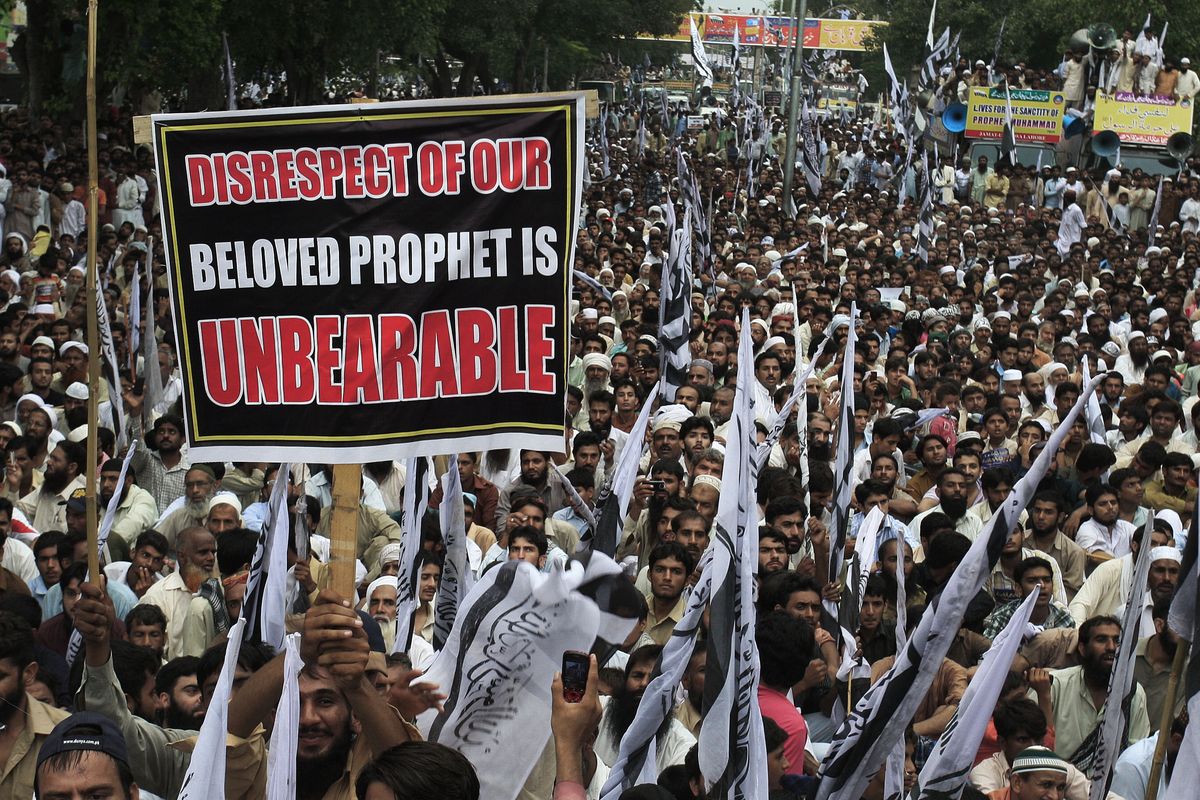UN ambassador says Libya attack was spontaneous

WASHINGTON (AP) — A deadly assault on a U.S. consulate in Libya was a spontaneous reaction to an anti-Muslim video, the U.S. ambassador to the United Nations said Sunday, even as Libya’s president insisted the attackers spent months preparing and carefully choosing their date — the anniversary of the Sept. 11 terrorist attacks.
Unnerved by the rapidly escalating raid on Tuesday that claimed the life of the U.S. ambassador to Libya and three other Americans, the Obama administration last week launched an investigation into whether terrorist groups had exploited outrage over an anti-Muslim video to trigger an attack long in the works.
But Ambassador Susan Rice said evidence gathered so far shows no indication of a premeditated or coordinated strike. She said the attack in Benghazi, powered by mortars and rocket-propelled grenades, appeared to be a copycat of demonstrations that had erupted hours earlier outside the U.S. Embassy in Cairo, spurred by a YouTube film attributed to a California man mocking the Prophet Muhammad.
“It seems to have been hijacked, let us say, by some individual clusters of extremists who came with heavier weapons,” Rice said, adding that such weaponry is easy to come by in post-revolutionary Libya.
Whether those extremists had ties to al-Qaida or other terrorist groups has yet to be determined, Rice said, noting that the FBI has yet to complete its investigation.
Rice’s depiction of the chain of events contrasted with one offered by Libya’s Interim President Mohammed el-Megarif, who said Sunday there was no doubt the perpetrators had predetermined the date of the attack.
“It was planned, definitely. It was planned by foreigners, by people who entered the country a few months ago,” el-Megarif said. “And they were planning this criminal act since their arrival.”
Brushing aside el-Megarif’s assessment, Rice said it wouldn’t be the first time that Western works critical of Islam have triggered spontaneous unrest throughout the Middle East. She pointed to Salman Rushdie’s novel “Satanic Verses” and cartoons of the Prophet Muhammad published by a Danish newspaper in 2006.
But Rep. Mike Rogers, the House Intelligence Committee chair, said it was premature to rule out a premeditated attack. A former FBI agent, Rogers, R-Mich., said there were too many coincidences to conclude the Benghazi attack hadn’t been planned in advance.
“There’s other information, classified information we have that just makes you stop for a minute and pause,” Rogers said, without elaborating.
Added Arizona’s Sen. John McCain, the top Republican on the Senate Armed Services Committee: “Most people don’t bring rocket-propelled grenades and heavy weapons to a demonstration.”
What started with protesters scaling the embassy wall in Cairo on Tuesday over an amateurish video deriding Islam’s holiest figure has mushroomed into a maelstrom of disquiet throughout the Muslim world. In Libya, U.S. Ambassador Chris Stevens and three other Americans were killed when protesters stormed the consulate in Benghazi. Anti-U.S. protests in 20 countries led the Pentagon to dispatch elite Marine anti-terrorism teams to Libya and Yemen and to position two Navy warships off Libya’s coast.
Meanwhile, the State Department ordered all nonessential U.S. government workers and their families out of Sudan and Tunisia. In Lebanon, protesters torched an American fast-food restaurant. Even as tensions appeared to be easing Saturday, al-Qaida’s most active Mideast branch was calling for further attacks on U.S. embassies.
“It’s approximately a reaction to this video, and it’s a hateful video that had nothing to do with the United States and which we find disgusting and reprehensible,” Rice said.
Rice’s comments appeared to mark a departure from an earlier State Department position.
Citing the ongoing FBI probe, State Department spokeswoman Victoria Nuland said Friday that until the Justice Department was ready to talk, no details would be released. “Not who they were, not how they happened, not what happened to Ambassador Stevens — not any of it.”
But the uncertainty of an anxious nation questioning what was gained by U.S. support for democratic, pro-Islamic uprisings in Muslim countries has created a sense of urgency that has been difficult for the Obama administration to ignore. The turbulence has also become a major issue in President Barack Obama’s re-election campaign, with the Republican rival for the White House, Mitt Romney, laying blame on the president and accusing him of apologizing for the U.S.
Doubts also persist about whether security measures in place to protect U.S. diplomatic missions, which were overwhelmed in Benghazi, were sufficient.
Rice said the U.S. had “no actionable intelligence” about any imminent attack in Benghazi, and that security was beefed up in Cairo following signs that the YouTube video might spark protests. She said foreign governments are stepping up to condemn the violence and to fulfill their obligations to protect U.S. embassies.
Rice said it’s too early to judge whether security should have been stronger in Libya. U.S. Marines, who commonly protect embassies abroad, were not assigned to the Benghazi consulate, the State Department has said. At the embassy in Cairo, Rice said, protections initially afforded by the Egyptian government fell short.
“When President Obama picked up the phone and spoke to the President (Mohammed) Morsi, right away things changed,” Rice said. “And that’s an evidence of our influence and our impact.”
Rice and Rogers spoke on “Fox News Sunday,” while el-Megarif and McCain spoke on CBS’ “Face the Nation.” Rice also appeared on NBC’s “Meet the Press” and on “Face the Nation.”
___
Reach Lederman on Twitter at http://twitter.com/joshledermanAP